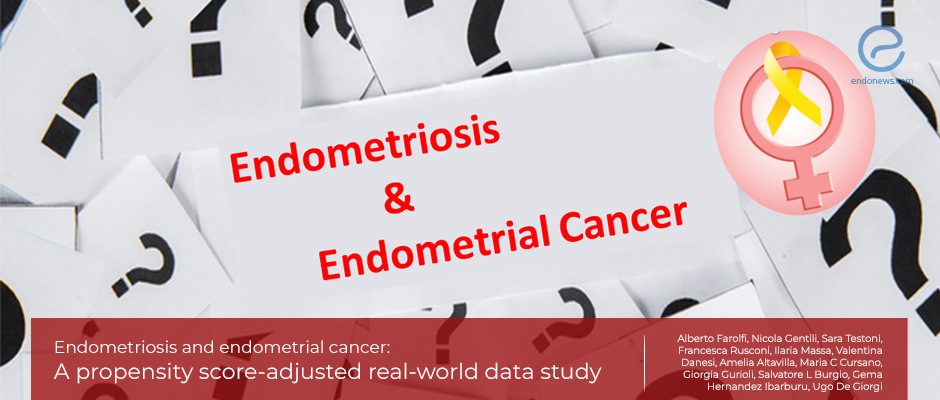Endometrial cancer risk in endometriosis: What does the real-world data reveal?
Jun 7, 2024
Real-world data study sheds light on endometriosis-endometrial cancer connection
Key Points
Highlights
- This study provides valuable insights into the relationship between endometriosis and endometrial cancer.
- Certain histological subtypes such as endometrioid and clear-cell carcinoma are associated with endometriosis.
Importance
- Endometriosis is a prevalent condition affecting millions of women worldwide, yet its association with endometrial cancer remains unclear.
- Somatic mutations found in both endometriotic glands and eutopic endometrial tissue suggest a potential link between endometriosis and endometrial cancer, sparking debate in the scientific community.
What’s done here
- This is a non-interventional retrospective study using real-world data from the Tri-NetX platform.
- Two cohorts were compared as women with endometriosis and a healthy control group.
- Endometrial cancer risk, histology, staging, and survival with propensity score matching were analyzed.
Key results
- The endometriosis cohort showed a higher incidence of endometrial cancer with an HR of 1.56 compared to the controls without endometriosis, indicating a significantly increased risk of developing endometrial cancer among women with endometriosis.
- Endometriosis patients were more likely to develop invasive endometrioid and clear-cell EC, with a significant association observed particularly for clear-cell EC.
- Prognosis analysis revealed a slightly higher but not statistically significant mortality risk for endometriosis-associated EC.
- Treatment modalities including radiochemotherapy, chemotherapy alone, or radiotherapy alone did not show significant differences in survival outcomes.
Strength and Limitations
- The strength of the study is the large sample size.
- The limitations include the absence of molecular data and reliance on real-world data which may have inherent biases, and dependence on diagnostic data coded by ICD-10, potentially missing milder endometriosis cases not requiring surgery.
Lay Summary
Endometriosis is considered a benign disease, however, studies showed certain somatic mutations in the endometriotic glands indicating a potential link to endometrial cancer. Later, eutopic endometrial tissue was demonstrated to have the same somatic mutations. This resulted in controversial findings as to whether endometriosis actually contributes to increasing the risk of endometrial cancer with meta-analyses and studies revealing different results.
Aiming to shed light on the question of whether endometriosis increases the endometrial cancer risk, researchers led by Dr. Farolfi from the IRCCS Romagnolo Institute in Meldola, Italy and TriNetX from Massachusetts, USA conducted a non-interventional, retrospective study using real-world data from a global health research platform called Tri-NetX. The study results were recently published in the April 2024 issue of the journal iScience.
The endometriosis cohort included 197,196 women diagnosed between 2005 and 2018, excluding those with prior endometrial cancer or inadequate follow-up. The control cohort comprised around 6,4 million women without endometriosis or previous endometrial cancer diagnosis. The two cohorts were used to calculate the relative risk of developing endometrial cancer, comparing histology and staging along with a survival analysis for patients with endometrial cancer. A propensity score matching was performed for age, race, inflammatory diseases of female pelvic organs, family history of primary cancer, presence of colon, rectosigmoid junction, and rectum cancer, and body mass index.
Endometriosis patients had a higher incidence of endometrial cancer, with 875 cases compared to 558 in controls, indicating a significantly increased risk of developing endometrial cancer among women with endometriosis. They were more likely to develop invasive endometrioid and clear-cell EC whereas no association was identified with invasive serous carcinoma. The authors discuss that even though the case numbers were only a few, clear cell endometrial cancer specifically showed a highly significant association with endometrial cancer which may indicate a common carcinogenetic pathway.
Endometriosis-associated endometrial cancer showed a slightly higher but not statistically significant mortality risk, suggesting that a previous diagnosis of endometriosis does not impact the prognosis of endometrial cancer. No significant differences in survival were found for patients treated with radiochemotherapy, chemotherapy alone, or radiotherapy alone. The authors observed decreased numbers of stage IV EC patients and stated that this might be due to the increased clinical visits during their endometriosis journey.
The authors conclude by saying that these findings underscore the need for further studies to molecularly characterize EC associated with endometriosis, providing insights into potential shared carcinogenetic pathways and informing personalized management strategies.
Research Source: https://pubmed.ncbi.nlm.nih.gov/38646168/
endometriosis endometrial cancer real-world data propensity score matching endometrioid carcinoma clear-cell carcinoma prognosis

